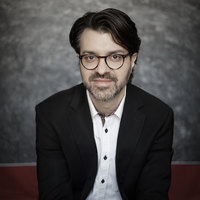
Kevin Mongrain
Related Authors
Inna Semetsky
Columbia University
Freddy Kokke
University Medical Center Utrecht ,The Netherlands
Egil Asprem
Stockholm University
Willow Sipling
Western Michigan University
Aren Roukema
University of British Columbia
Julian Strube
University of Göttingen
Dylan Burns
University of Amsterdam
Peter Olsson
University of Gothenburg









Uploads
Papers by Kevin Mongrain
leaders. The first is the current ecumenical patriarch of Constantinople, Bartholomew
I. The second is Roman Catholicism’s Pope Francis. Both leaders seek to support
members of their respective churches who are working to protect the environment, and also to speak globally across cultural and religious lines. Both Bartholomew and Francis believe the crisis of climate change has deep roots in modern culture’s anthropocentric ethos, and hence there must be an “apocalypse” or an unveiling of this ethos as a betrayal not only of nature but also of God the Creator. Contrary to some religious environmentalists, therefore, both Bartholomew and Francis are careful to distinguish cosmocentric theology (pantheism and animism) and theocentric cosmology (monotheism centered on the Incarnation of the Trinity in creation). Francis in particular aims for a retrieval of Saint Francis of Assisi’s relationship to the natural world as it was expressed by Saint Bonaventure, and later developed by Saint Ignatius of Loyola into a discipline (ascesis) of learning to see all created things as expressions of God’s glory. In rivalry with the ascesis of modern capitalism, which could be described as “disciplined avarice inaction,” Bartholomew and Francis advocate the classical monastic-Franciscan-Ignatian spiritual ethos of “disciplined contemplation in action.”
leaders. The first is the current ecumenical patriarch of Constantinople, Bartholomew
I. The second is Roman Catholicism’s Pope Francis. Both leaders seek to support
members of their respective churches who are working to protect the environment, and also to speak globally across cultural and religious lines. Both Bartholomew and Francis believe the crisis of climate change has deep roots in modern culture’s anthropocentric ethos, and hence there must be an “apocalypse” or an unveiling of this ethos as a betrayal not only of nature but also of God the Creator. Contrary to some religious environmentalists, therefore, both Bartholomew and Francis are careful to distinguish cosmocentric theology (pantheism and animism) and theocentric cosmology (monotheism centered on the Incarnation of the Trinity in creation). Francis in particular aims for a retrieval of Saint Francis of Assisi’s relationship to the natural world as it was expressed by Saint Bonaventure, and later developed by Saint Ignatius of Loyola into a discipline (ascesis) of learning to see all created things as expressions of God’s glory. In rivalry with the ascesis of modern capitalism, which could be described as “disciplined avarice inaction,” Bartholomew and Francis advocate the classical monastic-Franciscan-Ignatian spiritual ethos of “disciplined contemplation in action.”